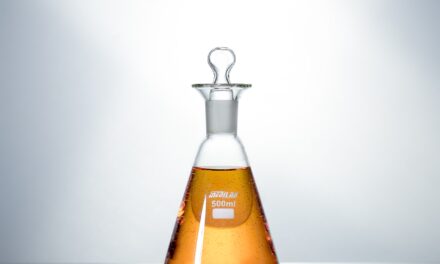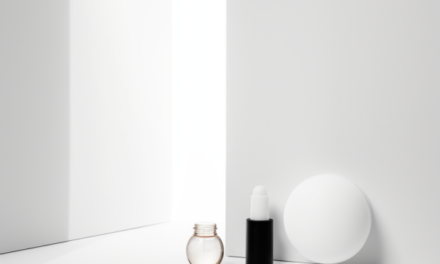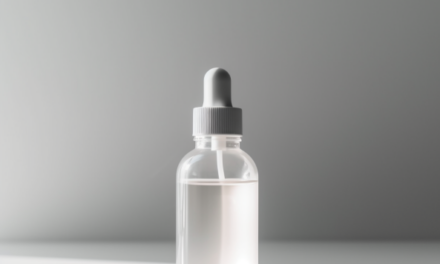Can Topical Skincare Restore Skin Elasticity?
As time takes its toll, our skin naturally starts to lose its bounce and elasticity. A common question arises, “Can topical skincare products restore our skin’s youthful firmness?” In short, they can help, but only to a certain extent. In this post, we’ll discuss skin elasticity and what to realistically expect from your topical skincare.

Understanding skin elasticity
Let’s consider our skin to be like a rubber band. Skin elasticity refers to the ability of our skin to stretch and then return to its original shape. This feature contributes to the overall plumpness, firmness, and ‘springiness’ of our skin. Skin elasticity is measurable using a device known as a cutometer, which employs suction to measure how quickly your skin bounces back after being pulled.
The trio behind skin elasticity
Three key components—elastin, collagen, and water-binding elements like hyaluronic acid—combine to provide our skin its elasticity. Collagen offers structure, strength, and support, while water-binding compounds aid in stretching the skin. Elastin, a protein that forms elastic fibers, is the primary resource our skin uses for stretching and bouncing back.
Interestingly, elastin and elastic fibers have a very slow turnover compared to collagen. In essence, our skin largely relies on the elastic fibers produced during our childhood. These enduring fibers withstand significant wear and tear over time, but unfortunately, the skin lacks the capacity to naturally replenish or repair them fully.
Can topical treatments help?
As we age, the production of all three ‘elasticity players’ decreases. On the bright side, topical skincare, like retinoids, can stimulate the production of collagen and water-binding compounds.
However, elastin production is a tougher nut to crack.
There are no proven topical treatments to enhance the production of skin’s elastin.
The complexity of elastin production and the process of forming elastic fibers make it challenging to stimulate and regulate the assembly process. The science hasn’t quite caught up with this one yet.
Consequently, topical skincare has a limited impact on restoring skin elasticity as it can only assist with two out of the three required components. Although topical treatments can boost collagen and hydration levels, they can’t repair elastin. Keep this in mind when assessing product claims about skin firming, elasticity restoration, and sagging skin reduction.
Strategies to protect our existing elastin
Since we currently can’t aid the skin in restoring elastic fibers, our best approach is to protect the existing elastin. Here’s how to guard your valuable elastin reserves.
- Prioritize overall health through a balanced lifestyle and proper nutrition.
- Protect your skin from sun damage using daily sunscreen and incorporating antioxidants in your topical skincare routine.
- Avoid skin irritations as inflammation can harm elastin over time.
As for products that pledge to rejuvenate or restore elasticity, treat these promises with a dose of skepticism. They can enhance collagen and hydration, improving skin elasticity to some extent. However, they can’t completely eradicate sagging skin or dramatically restore skin firmness. Instead of investing in an array of potions, concentrate on overall health, daily sun protection, and good nutrition.
Choose your products based on actives
WIMJ Search allows you to select skincare products based on what’s inside. Filter products by actives included, and exclude ingredients you don’t want. Check the concentration of ingredients and potential irritants.
Sources
- Clinical Relevance of Elastin in the Structure and Function of Skin https://academic.oup.com/asjopenforum/article/3/3/ojab019/6275566
Here is a video from a British dermatologist Dr. Sam Bunding where she explains why you shouldn’t expect topical skincare to restore skin elasticity and firmness.
Related Articles
Winter Skin Care: Navigating the Chilly Season with Healthy Skin
Let’s dive into understanding winter skin and how to best care for it.
When Buying Skincare, What Are You Really Paying For?
Ever wondered what’s behind the price tag of your skincare product? Are you just forking out for fancy ingredients and chic packaging? The reality may surprise you. Let’s break it down and see where your money really goes.
The Dark Side of Lightweight Sunscreens
Do lightweight sunscreens provide enough sun protection? Lightweight sunscreen formulas have a higher risk of not providing the sun protection they promise. Learn more in this article.
Can You Use Retinoids for Rosacea-Prone Skin?
If you’ve been grappling with the frustrating skin condition called rosacea, you may have been advised to steer clear of retinoids. This advice typically stems from concerns that retinoids can further irritate your already inflamed skin. But here’s something that may surprise you: retinoids, in fact, are commonly used in rosacea medical treatments.
Opting for Fragrance-Free Skincare: A Skin-Friendly Choice
Opting for Fragrance-Free Skincare: A Skin-Friendly ChoiceIs the smell of your skincare products hurting your skin? It's a question we often don't think about. Yes, the scents can be nice, but they can also cause problems. About one in three skin issues from cosmetics...
What Does Sensitive Skin Mean and How to Help It?
Discover what sensitive skin truly means. We break down the causes, symptoms, and potential triggers of sensitive skin, and share simple steps to manage and reduce skin sensitivity effectively.
Do Collagen Supplements Work for Skin?
In recent years, collagen supplements have gained popularity for reducing signs of skin aging and improving skin health. But do they actually work? In this post, we will discuss the evidence from randomized, double-blind, and controlled trials that have evaluated oral supplementation with hydrolyzed collagen for improving skin hydration, reducing wrinkles, and improving elasticity.
The Aging Face: the Brutal Truth About Skincare Limitations
Explore the deeper aspects of aging, beyond skin-deep. Learn how bones, muscles, and fat influence facial changes and understand the limitations of skincare in fighting time. Embrace the natural evolution of your beauty with a fresh perspective.
Do You Really Need Custom-Made Skincare?
Custom-made skincare products have become a talking point recently. But are they an essential innovation in skincare or simply a captivating marketing gimmick? This blog post delves into whether personalized skincare truly offers advanced scientific solutions tailored to our unique needs or is it luring us into paying more for seemingly “perfect” products.
Is Skincare A Scam?
Is Skincare a Scam? "Is skincare a scam?", you might wonder after spending $$$ on products that don't work. Or better put, "does the beauty industry turn skincare into a scam?". In many ways, yes - unfortunately. As consumers, we crave innovation, seeking skincare...
Do I Need Sunscreen for Indirect Sunlight?
How often have you heard that sunscreen is key for protecting our skin from the sun? A lot, right? But, does this same rule apply when you’re in indirect sunlight, in the shade or on a cloudy winter day? The answer is yes. Here’s the explanation.
The Ultimate Guide to Sunscreens And Sun Protection
“Understanding why sunscreen is important in skincare is essential for maintaining youthful, healthy skin. Scientists have found that a staggering 80% of externally-caused skin aging is a result of sun damage. The effects? A variety of skincare woes such as pigmentation problems, scarring, and enlarged pores as we age. So, whether you’re dealing with anti-aging, acne, or pigmentation concerns, sunscreen is an irreplaceable part of your skincare routine. And remember, it’s vital for all skin tones – yes, even the darkest ones.”
The Ultimate Guide to Skin Cleansing
Daily skin cleansing is an essential part of skincare, but do we truly understand why we cleanse our skin and how it works? How often should we wash our skin? Let’s dive deep into the world of skin cleansing and clarify the typically overlooked basics.
How to Choose A Good Moisturizer?
Choosing the right moisturizer for your skin can be a daunting task. The market is awash with countless products, each promising to hydrate, protect, and nourish your skin. So, how do you make an informed choice? Let’s break down the evidence behind effects of moisturizers, debunk marketing myths, and learn how to choose the best moisturizer for your skin.
How Many Steps Do You Really Need for A Good Skincare Routine?
What Steps Do You Really Need for A Good Skincare Routine?Taking care of your skin is more than just a beauty routine - it’s an important part of maintaining overall health. But skincare can be overwhelming, with so many products and steps to choose from. While there...
Products for Melanated Skin: An Essential Guide to Choosing the Right Skincare
You can choose better care products for melanin-rich skin if you understand your skin tone needs better. If you have melanated skin – or, in other words, a naturally dark skin tone – it’s essential to have a more gentle skincare approach and a stronger focus on avoiding skin trauma, irritation, and inflammation. Let’s delve into the nitty-gritty of caring for melanated skin.
Skin Types: Should You Bother?
Skin Types: Should You Bother?If you are into skincare, you must have heard about skin types. They are everywhere in the skincare world: on products ("for oily", "dry skin"), on various online quizzes ("find out your skin type") and in articles in beauty magazines....
How to Start Anti-Aging Skincare?
In this post, we’ll dive into the science behind skin aging and explore the different factors that can impact our skin’s health. We’ll also discuss some of the best skincare strategies to help you start your anti-aging journey and keep your skin looking its best.
Vitamin C (Ascorbic Acid) for Anti-aging
Ascorbic acid, also known as vitamin C, is a powerful anti-aging ingredient that has been extensively researched for its skin benefits. It can help reduce fine lines and wrinkles, fight other signs of photodamage, and reduce hyperpigmentation when used correctly.
Peptides for Anti-Aging
Peptides are a confusing active in skincare. On one hand, we have research that shows that they can work and deliver impressive skin results. On the other hand, there are hundred of different peptide ingredients in skincare products, and some of them can do little more than a simple moisturizer. Read on to learn about the difference.
Niacinamide for Anti-Aging
Anti-AgingNiacinamideVitamin B3. In concentrations from 2%, Niacinamide helps the skin to produce its own antioxidants that in turn fight photo-damage. Niacinamide rarely caused irritation. Most people can use it once or twice daily. Niacinamide can be included in a...
Retinoids for Anti-Aging
Retinoids are the most well-research skincare actives for anti-aging. Learn what they are and how to use them effectively in a routine.
WIMJ Skincare System
5 simple principles for real results




